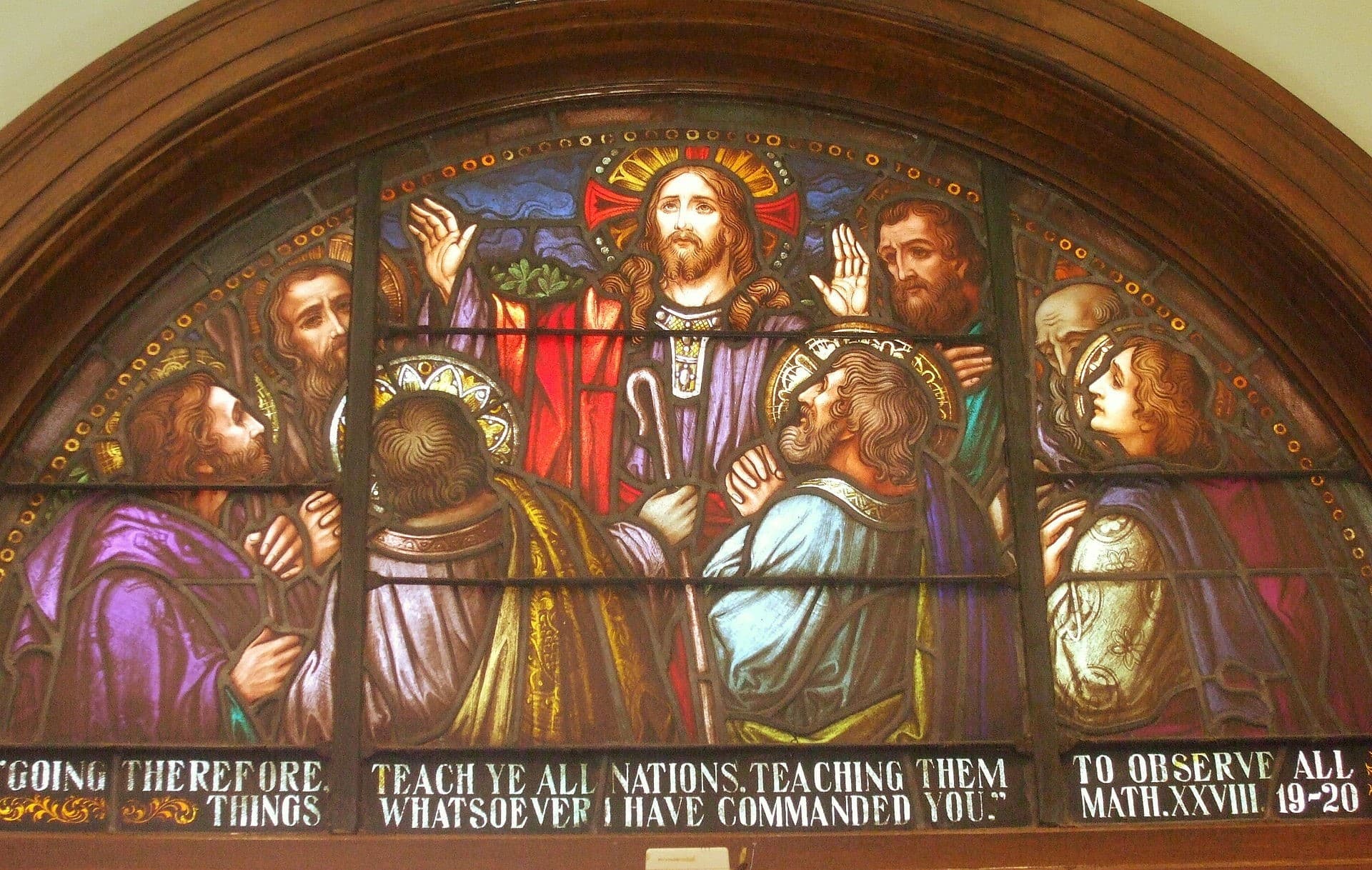
Photo: Cathedral Parish of St. Patrick, El Paso, TX
Mt 28:19 Go therefore and make disciples of all the nations, baptizing them in the name of the Father and the Son and the Holy Spirit, 20 teaching them to observe all that I commanded you; and lo, I am with you always, even to the end of the age.” (All Bible passages NASB unless specifically noted)
The command of the Great Commission is not to go, but to disciple. Consider theologian Dr. D.A. Carson’s commentary:
The main emphasis in this verse is on the command to “make disciples” (GK 3411; the rest of the verb forms are participles, though they function like imperatives). To disciple a person to Christ is to bring that person to accept Christ as his or her teacher. Disciples are those who hear, understand, and obey Jesus’ teaching (12:46—50). This injunction is given at least to the Eleven, but to the Eleven in their own role as disciples. Therefore they are paradigms for all disciples to make others what they themselves are—disciples of Jesus Christ.[1]
The challenge for us is how do we as disciples “make” disciples. In the KJV, the word we translate as “make disciples” is translated as teach. The quote above points at the intent of the verse and of the Great Commission, we as disciples are to go discipling.
Discipling is living out – getting up each day with a shedding of self – as my life default and now demonstrating, in character and actions, my surrender” as a follower of Christ, enthusiastically pursuing His commands. This means that our main task is to love God, our neighbor, and one another as Christ loved us. The depths of true love are vast, but one brief biblical example of such love is penned by the Apostle Paul: “Let love be without hypocrisy. Abhor what is evil; cling to what is good. 10 Be devoted to one another in brotherly love; give preference to one another in honor; 11 not lagging behind in diligence, fervent in spirit, serving the Lord; 12 rejoicing in hope, persevering in tribulation, devoted to prayer, 13 contributing to the needs of the saints, practicing hospitality. 14 Bless those who persecute you; bless and do not curse. 15 Rejoice with those who rejoice, and weep with those who weep. 16 Be of the same mind toward one another; do not be haughty in mind, but associate with the lowly. Do not be wise in your own estimation. 17 Never pay back evil for evil to anyone. Respect what is right in the sight of all men. 18 If possible, so far as it depends on you, be at peace with all men. Romans 12:9-18”
This discipling is not the isolated task of leaders or ministers, it is the purpose of life for everyone that confesses Christ, is forgiven and expects everlasting life. The task of the leader, as a disciple is to train, equip and develop disciples. Discipling is not primarily evangelism by all, it is a life of love spent in selfless service for others, some disciples also being evangelists (see Ephesians 4.11) . Most of us are living out God’s design through ordinary acts in our vocations and neighborliness, not as bible scholars nor as evangelists continuously sharing the gospel.
Let’s consider the passage in Matthew 28.19 word by word:
Discipling- mathēteúō (μαθητεύω) v. to be a disciple, to make a disciple G3100. The masculine noun is G3101 used for the eleven disciples in Mt 28:16. We, followers of Christ, are discipling when we as disciples go into other groups to make disciples as those who are called Christians obeying Jesus’ commands.
Go – poreúomai (πορεύομαι) G4198 means to travel, to depart. Jesus’ first words to disciples are, “Follow Me, and I will make you fishers of men.” (Mt 4:19) His last words are, “Go, discipling all nations… I am with you always to the end of the age.” (Mt 28:20)
Nations – éthnos (ἔθνος) G1484 means a community living together, a family, a tribe. nation, group. Jesus’ command is not calling all of us to foreign missions but to be and make disciples in every community and group we are a part of. We go when we leave our home and the command is to be discipling.
Baptize- baptízō (βαπτίζω) G907 means to wash or dip, to be overwhelmed. In the Gospels, it is used mainly for John’s baptism and for Jesus’ institution of baptism with the Holy Spirit and fire. The command to baptize disciples into Christ is to affirm their change in identity as a new creature in Christ. Being a disciple is their meaning, purpose and goal in life. We become disciples in baptism as we repent and believe.
Repent– metanoéō (μετανοέω) G3340 means to change your mind. Repentance is connected to the command to baptize and that is because baptism is not primarily a call to moral improvement, giving up moral failures that are sin and resolving to change. Repentance is not primarily a turning away from sin but is fundamentally a change of mind and in the call of John and Jesus, a call to a new world view, a new identity. That is why baptism is in the name of Christ, we are becoming His.
Believe- pisteúō (πιστεύω) G4100 means to hold as being true, to trust. In an odd development, believing is seen often as something unexpected that we hope for instead of something true that we know. The call to believe is not a call for an unlikely future hope but the understanding that something is true. Our certain hope is not that we hold to something incredible that may be true but that we know that our incredible Savior is the truth of our lives and of all reality. He is the way, the truth and the life.
Teaching- didáskō (διδάσκω) G1321 means to teach. The task of discipling after conversion, articulated as baptism, is teaching and being those who observe all that Jesus, the Christ, the Davidic King, our Savior; has commanded us. Jesus is commanding us to teach keeping His commands as the core of discipling. Our teaching in discipling includes not opnl;y traditional instruction but a shared life, modeling keeping the commands.
Keeping- tēréō (τηρέω) G5083 means to keep a watch, take care, to observe, to keep. The emphasis is not the legal forensic keeping of law in obedience although it does expect responsible compliance. The emphasis is in discharging our responsibility as disciples to comply with Jesus’ commands. Disciples keep Jesus’ commands and teach others to keep them.
Commands- entéllomai (ἐντέλλομαι) G1781 means to give a charge, to injoin, to command. Jesus’ commands are required for disciples and identify the moral framework of our lives but commands are not primarily moral law but an authoritative charge of responsibility. We keep the commands of Jesus not to become morally better, but to serve Christ but discipling others to advance His Kingdom. We can see this clearly when we look at the commands that Jesus emphasizes:
Mt 22:37 Jesus replied: “‘Love the Lord your God with all your heart and with all your soul and with all your mind.’ 38 This is the first and greatest commandment. 39 And the second is like it: ‘Love your neighbor as yourself.’ 40 All the Law and the Prophets hang on these two commandments.”
Jn 13:34 “A new command I give you: Love one another. As I have loved you, so you must love one another. 35 By this everyone will know that you are my disciples, if you love one another.”
Jn 15:9 “As the Father has loved me, so have I loved you. Now remain in my love. 10 If you keep my commands, you will remain in my love, just as I have kept my Father’s commands and remain in his love. 11 I have told you this so that my joy may be in you and that your joy may be complete. 12 My command is this: Love each other as I have loved you. 13 Greater love has no one than this: to lay down one’s life for one’s friends
These passages are making a very blunt point: Disciples – the true followers of Christ – deploy God’s love everywhere they go. Because Jesus has claimed us for His own and commissioned us to be and to make disciples, we have been equipped with the love of God. We are to be radically changed (“transformed” – Romans 12.2 and 2 Corinthians 3.18) as we love God as His children because He has promised He is actually, truly and fully present with us moment by moment now, we are no longer to live enslaved our self and our cravings and fears – we are “enslaved” to Him, to that love. As His and in Christ, we are to love our neighbor as ourselves. We learn the nature and acts of love by Jesus’ teaching which show us that the Law and the Prophets properly understood teach us how to love.
Most of all, Jesus’ command is that we selflessly and sacrificially use our life to serve one another in love. That’s what we are to go and do, every minute from here forward as his disciples.
[1] Carson, “2. The Great Commission (28:18-20).”
